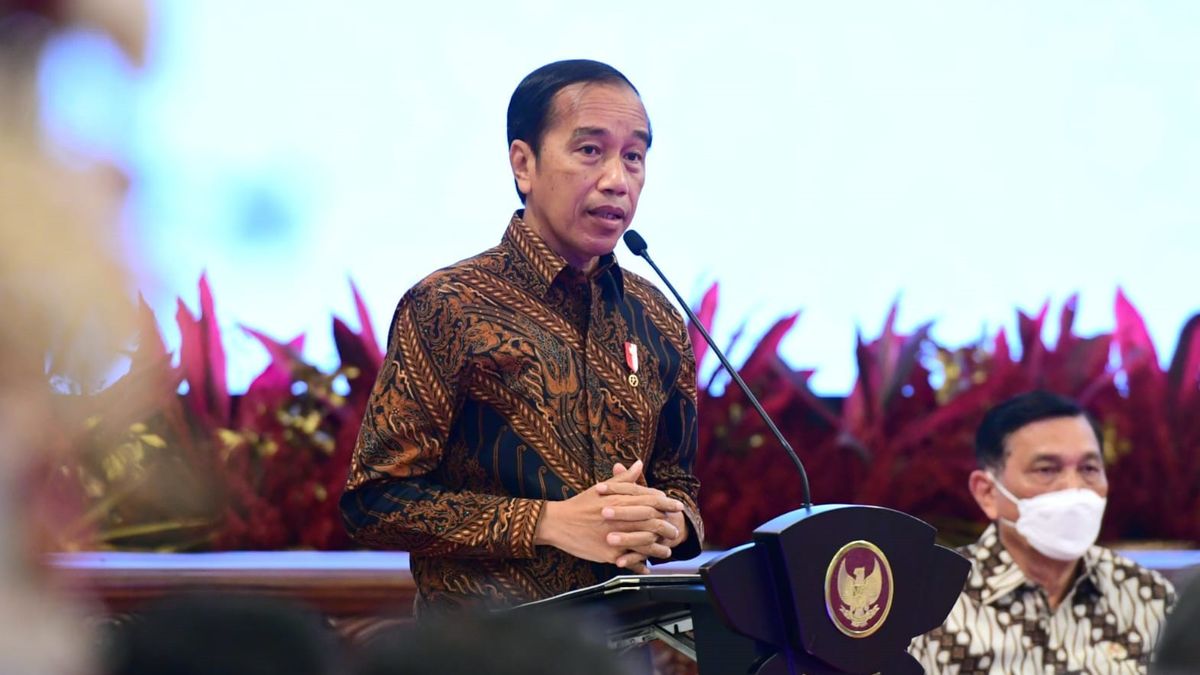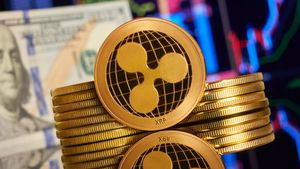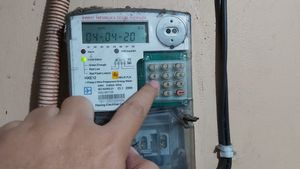JAKARTA - The world is in a bad condition right now. The COVID-19 pandemic that has occurred since 2020 has ravaged the economic conditions of world countries. Damage to global supply chains because almost all countries carry out strict restrictions in an effort to prevent the spread of the virus.
In mid-2021, a number of countries will begin to emerge from recession. Conditions are not completely normal. The movement of large market demand has not been matched by the availability of goods and services. Not to mention, the condition of distribution access, whether by sea, land, or air, is still stagnate.
That is why, price increases, including food and energy, of course cannot be avoided, until in a sustainable time. On the other hand, Russia's military aggression against Ukraine further exacerbated the situation. It hinders economic recovery and further triggers inflation in many countries.
In fact, according to Anton Hendranata, Chief Economist of PT Bank Rakyat Indonesia (Persero), inflation in several countries is already in a chronic and abnormal stage.
"So there is concern that the world economy will experience stagflation, namely a recession accompanied by high inflation," said Anton in his writing entitled 'Chronic Inflation' in Kompas.
Look at the United States, where inflation reached 8.6 percent in May 2022. In fact, in normal conditions it is only 1.5-2.5 percent. Then, the European Union from 0.7-1.7 percent jumped to 8.6 percent in June 2022, Japan from 0.2-0.8 percent to 2.5 percent in May 2022, and worst hit Turkey which reached 73.5 percent in May 2022.
Meanwhile in Indonesia, data from the Central Statistics Agency (BPS) stated that the inflation rate for the calendar year (January-June) 2022 was 3.19 percent and the year-on-year inflation rate (June 2022 to June 2021) was 4.35 percent.

“The core component in June 2022 experienced inflation of 0.19 percent. The core component inflation rate for the calendar year (January–June) 2022 is 1.82 percent and the year-on-year core component inflation rate (June 2022 to June 2021) is 2.63 percent.
That is why, President Jokowi continues to warn his staff not to be careless. Don't just work routinely and standards, but have to work in detail.
According to Jokowi, the spike in the inflation rate as of July 2022 to 4.94 percent could be controlled because of the large energy subsidy from the APBN which reached Rp502 trillion.
“Will the state budget continue to be strong? Pertalite, Pertamax, diesel, LPG, electricity are not real prices, not economic prices, those are prices subsidized by the government," he said.
Looking at the latest conditions, world crude oil prices continue to increase despite fluctuating. For example, Brent crude, Anton said that it had risen about 186 percent since 2018.
On Thursday (18/8), the price of Brent crude oil was US$96.12 per barrel and West Texas Intermediate (WTI) crude oil was US$90.27.
Meanwhile, Indonesia inevitably has to import crude oil because domestic production is insufficient. Benny Lubiantara, Deputy for Planning of SKK Migas at the Energy Outlook 2022 event last February, said that Indonesia's crude oil production was only able to reach 700,000 thousand barrels per day.
"Meanwhile, consumption reaches 1.4-1.5 million barrels per day. The government's target in 2030 is 1 million barrels per day. Even that is still a deficit and still has to be imported," he said.
Import Value SoaredBPS reported that the value of Indonesia's oil and gas energy imports in the first half of 2022 jumped 68.98 percent over the same period the previous year. Reached US$19.46 billion or Rp.291.96 trillion (at an exchange rate of Rp.15 thousand per US dollar).
In details, the value of oil and gas imports in the form of oil products (refined oil reached US$ 12.01 billion, doubled from the previous year which was only US$ 6.18 billion.
"The import value of oil products accounts for 61.7 percent of the total value of national oil and gas imports," BPS wrote.
Then, the value of crude oil imports was 4.74 billion US dollars, up 28.68 percent from the previous price of 3.68 billion US dollars. Finally, the value of gas imports was 2.72 billion US dollars, a 64.03 percent jump.
The soaring value of Indonesia's oil and gas imports cannot be separated from the increase in world crude oil prices by 44.74 percent (year to date/ytd) to the level of US$114.81 per barrel at the end of June 2022 compared to December 31, 2021, which was still in position 79. 32 US dollars per barrel. Oil and gas imports have also become more expensive due to the strengthening of the US dollar against major world currencies.
As a result, as an effort to overcome the swelling of energy subsidies sourced from the APBN, there has been a discourse to increase the price of pertalite from Rp. 7,650 per liter to Rp. 10,000 per liter.

According to Pertamina's report, said Minister of Energy and Mineral Resources (ESDM) Arifin Tasrif, Pertalite consumption until July 2022 has reached 16.8 million kiloliters, equivalent to 73.04 percent of the total quota set at 23 million kiloliters. This high consumption figure makes the Pertalite quota remaining only 6.2 million kiloliters.
“If the government increases the quota for subsidized fuel, the burden on the state budget for subsidies could increase to more than Rp600 trillion. However, if the government does not increase the quota for subsidized fuel, then shortages will occur at various gas stations which have the potential to trigger social unrest," said Arifin as quoted by Antara, Tuesday (16/8).
Very DilemmaticResearcher from the Institute for Development of Economics and Finance (Indef) Nailul Huda asked the government to still consider the impacts that arise if the discourse on increasing Pertalite is carried out, especially the impact on the lowest 40 percent of household groups and MSMEs.
An increase in the price of subsidized fuel is likely to worsen inflation, which is currently still under control. This is because the increase in fuel prices will inevitably raise other prices.
"If subsidized fuel is not increased, the burden on the state budget will be heavier. The scheme that might be appropriate is to increase the price of non-subsidized fuel, but there needs to be anticipation from the side of the beneficiaries of subsidies and stocks," said Huda as quoted from tempo.co, Wednesday (17/8).
However, Anton believes that the main cause of inflation in Indonesia is the problem of unbalanced supply and demand. The increase in demand is relatively small. He assessed that the government's steps through the APBN instrument were very appropriate to reduce energy inflationary pressures by increasing energy and electricity subsidies in 2022.
"High commodity prices and increased economic activity have caused state revenues to rise by 12.7 percent and this is expected to be a buffer for the increase in subsidies and social assistance to maintain people's purchasing power," he said.

However, inflation is not just a matter of energy. Indonesia should be grateful because food prices, especially rice, are still under control at around Rp. 10,000 per liter. This price is much cheaper than the price of rice in a number of countries, for example in Japan Rp. 66,000, in South Korea Rp. 54,000, in the United States Rp. 53,000, and in China Rp. 26,000.
However, you still have to be vigilant. President Jokowi asked regents, mayors and governors to work together with the Regional Inflation Control Team (TPID) to continue to monitor price increases that occur.
“Ask in our area what is the rising price that causes inflation. It could be rice, it could be red onion, it could be chili and check. The Central Inflation Control Team checks which areas have an abundant supply of chili or an abundant supply of rice? Continued, this must be continued because this country is a big country,” explained President Jokowi.
"We can no longer work routinely. We can't work just looking at the macro, it won't work, believe me. The macro is seen, the micro is seen, moreover, the details must also be seen through the numbers and data. Because the situation is not normal," said President Jokowi.
The English, Chinese, Japanese, Arabic, and French versions are automatically generated by the AI. So there may still be inaccuracies in translating, please always see Indonesian as our main language. (system supported by DigitalSiber.id)











